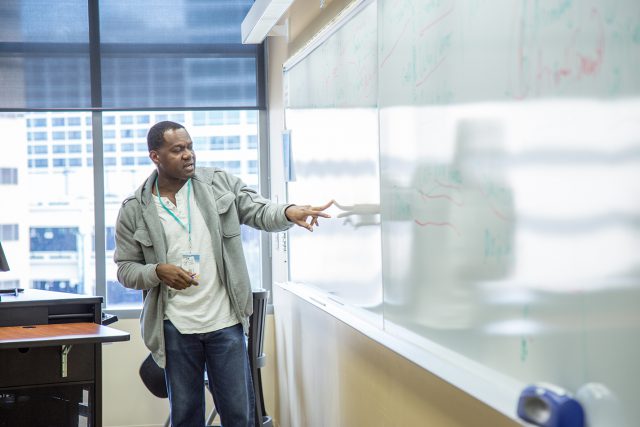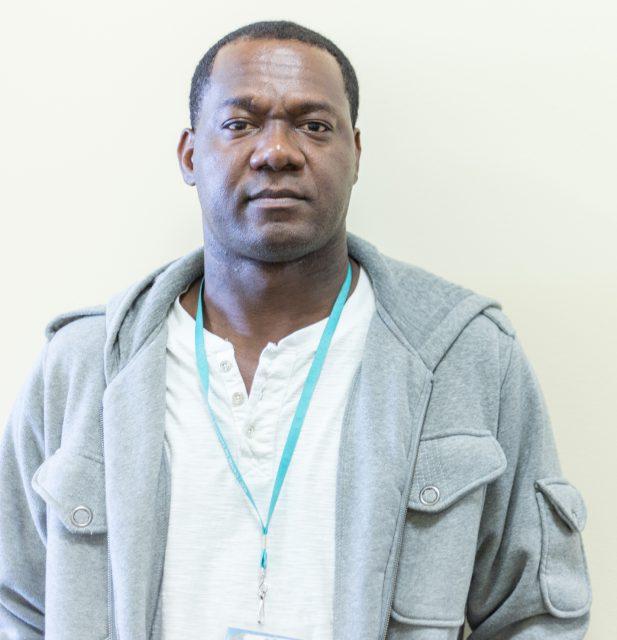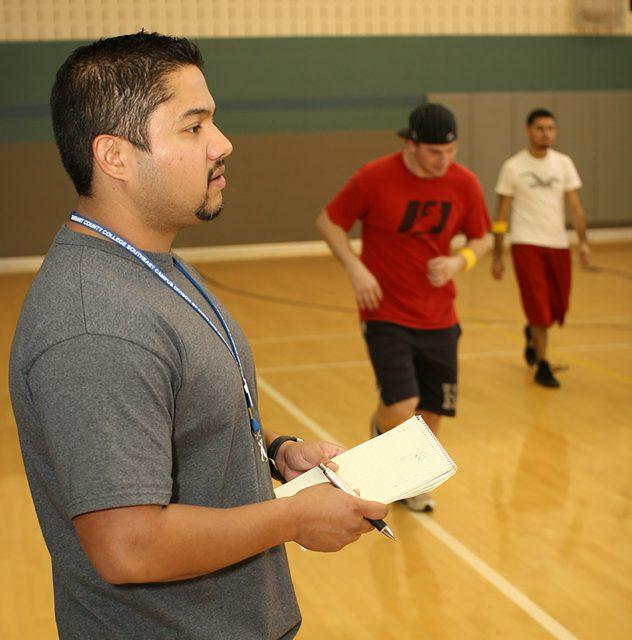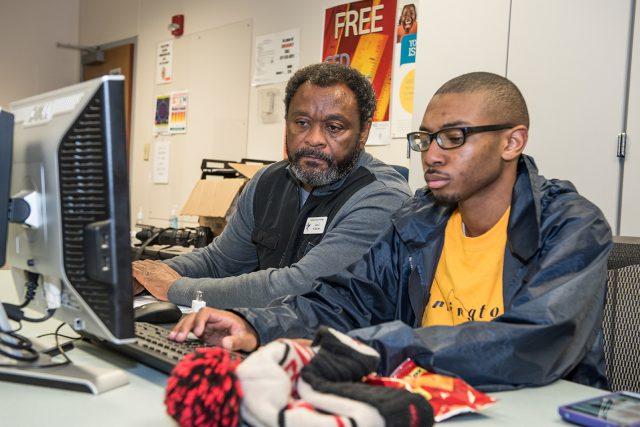By Kathryn Kelman/editor-in-chief
TR instructor shares his story as sexual assault victim
Sheldon Smart has battled poverty, homelessness and immigration and survived.
The Trinidad and Tobago native is the first in his family to attend college and has earned a doctorate. He’s been a full-time TR speech instructor since 2013, a mentor with the Men of Color mentoring program, a life coach and educational technician at a substance abuse rehabilitation clinic, a YouTuber and he’s hoping to publish a novel at the end of this year.
But it was a casual conversation with a friend while watching TV last fall that he realized he needed to speak up about something else — the fact that he was sexually assaulted.
“I was sitting there watching it, and me and my best friend were talking about it and he knew what I’d been through, and I’m watching it and we’re talking about it and I’m realizing, ‘Geez man, I fit into this category, but I’m not saying anything and they are,’” he said.
Smart is opening up about his life now because, in the wake of the #MeToo movement, he realized he could also use his story to show others that they too can overcome their struggles and to pursue their dreams.
Between the ages of 10 and 11, Smart was repeatedly sexually abused by the cousin of a man his grandmother was seeing at the time. The man watched him because Smart was too young to stay home alone. He vividly remembers the first time it happened.
The two were in a bunk bed, Smart on the top bunk with his abuser on the bottom.
“I remember him getting up and reaching under my shorts,” he said.
He was awake the whole time but feigned sleep. His abuser, Smart remembered, said things like, “It’s OK. This is natural,” and “No one will believe you if you say anything.”
The molestation went on until Smart was old enough to stop having to go there. He never confronted his abuser and always pretended to be asleep when it would happen, he said.
He battled shame, questioned his sexuality and feared what others would think if they found out. To cope, Smart did what he’d been taught to do, which was to pray and be strong.
He didn’t let it stop him and actually got better in school after the abuse started because he threw himself into his studies. His grandmother, the most influential person in his life, taught him that school would be his way out. Throughout his academic career, he’d lose himself in books and getting good grades.
“I used school as a means of dealing with pain,” he said.
Eventually, he told his grandmother and even a college roommate, but other family members and friends didn’t know, he said.
“One of the reasons I was hesitant to talk about it at first was people would say ‘Well, maybe if you let it happen several times, after that, maybe you wanted it,’” he said.
He remained hesitant to talk about it until the #MeToo movement last fall.

Photo by Lacey Phillips/The Collegian
“That was really, I think, the turning point when I saw famous people, wealthy people be able to put their business out there it was like, ‘Well, who am I? I can do it too,’” he said.
Smart said he’d like to see more men speak up about their strifes with sexual assault.
“We always get more stats where women are concerned, but I think there are a lot of men out there who are hurting and they don’t report it,” he said. “I think men a lot of times stay too silent because we think it’s not masculine if we do or say certain things, but men have emotions and men have feelings.”
Smart said he hopes by sharing his story, it will make it easier for others to share theirs.
“When you speak up and speak out, I think it’s easier to come to terms with what has happened to you and to really find yourself,” he said. “Then you empower others to do the same.”
Following the assaults, Smart continued to pursue his education. After high school, he worked for a few years to save money because his family didn’t have the funds to send him to college and he refused to let his grandmother take out a loan to help pay for it.
In addition to struggling financially, Smart also lacked support from other family members. Although they loved him, they didn’t believe in him and made jokes about his dreams.
“When you grow up in a family where no one has ever accomplished anything, their expectations for you match their expectations for themselves,” he said.
Smart wanted to prove them wrong, and he did. In fact, two weeks ago, he sent an uncle $1,000 to get his car fixed, he said.
“You’ve got to keep on dreaming, I think, even when people don’t believe in your dreams,” he said. “What’s most important is you believing in them.”
After being accepted to Clarendon College in Clarendon, Texas, Smart decided to chance it. He came to the U.S. in 1999 at 22 with only $300 in his pocket.
“Sometimes when you’re young, ignorance is good because I showed up thinking, ‘Well, I saw it on TV and other people can go to America and they could make it,’” he said.
When his flight landed in Miami, Smart purchased a $10 calling card and used it to let his family know he’d made it to the U.S.
In Clarendon, Smart worked several jobs off campus and tutored and mentored other students for free while taking classes.
“I came prepared to work because I’d always heard from everyone that lived in the U.S. and came back home, ‘America’s hard. You’ve got to work,’” he said. “One thing was for sure, I did not want to fail, and I was willing to work as hard as possible to do whatever to make sure I did not fail.”
Smart said even though he has his doctorate now, he most values his associate degree.
“For me, it meant confirmation and affirmation that I could do this and that I had accomplished something that no one ever thought that I would accomplish coming from the family that I came from,” he said.
While at Clarendon, Smart met Itai Chinhamo, who was born and raised in Zimbabwe before finishing high school in London and coming to Clarendon in 2000.
“It was a small town and a small school,” she said. “All the international students could sit at one table together.”
Though she doesn’t remember the first time they met, Smart is like an older brother to Chinhamo, and for 18 years has been a calming and grounding force in her life. He was one of the first people that empowered her, she said.
“I wish there were more Sheldons in the world,” she said. “I always knew he was going to do something great.”
When Smart became a full-time faculty member at TCC in 2013, he joined the Men of Color mentoring program at TR shortly after. Tre’Zjon Cothran attended TCC from 2013-2015 and found Smart to be a mentor.
“He always knew the answers and helped guide me and motivate me to do more than just pass a class,” he said.
Smart helped Cothran open up by sharing about himself and his journey including all of the hardships he faced, Cothran said.
“You don’t realize the journey he went through,” he said. “When he shared, I remember thinking, ‘Man, if he can make it, I can make it,’ and I wanted to know how he made it through.”
Today, Chinhamo describes Smart as a “world changer.” He uses YouTube and his classroom to share his stories to inspire others.
“I believe sharing stories empowers people and makes them feel less alone,” he said.




































